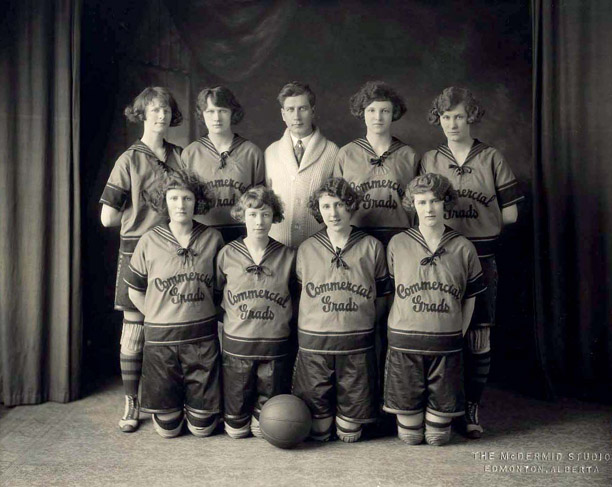 The Edmonton Grads were a Canadian women's basketball team. While long disbanded, the team continues to hold the North American record for the sports team with the best winning percentage of all time. The Grads won the first women's world title in basketball in 1924. In 1923, Canadian and American women's basketball champion teams competed for the first international Underwood Trophy. The Edmonton Grads faced off against the Cleveland Favorite-Knits and defeated them with a two-game score of 53–33, becoming the inaugural Underwood Trophy winners.
The Edmonton Grads were a Canadian women's basketball team. While long disbanded, the team continues to hold the North American record for the sports team with the best winning percentage of all time. The Grads won the first women's world title in basketball in 1924. In 1923, Canadian and American women's basketball champion teams competed for the first international Underwood Trophy. The Edmonton Grads faced off against the Cleveland Favorite-Knits and defeated them with a two-game score of 53–33, becoming the inaugural Underwood Trophy winners.In 1912, 25-year-old teacher John Percy Page had moved from Ontario to Edmonton, Alberta, where he was employed by local high schools to organize commercial classes. Page soon taught commercial classes at the newly-established McDougall High School. When Page decided to organize basketball teams for the school, his teaching assistant chose to coach the boys team, while Page coached the girls.[4] Despite having only a basic knowledge of basketball, Page improved his understanding of the sport through study. He held practices twice-weekly. The high school had no gym, so students practised basketball on an outdoor court throughout the year, even during frigid winter weather. Beginning their first year of competitive play in 1914, the McDougall High School girls team won a local high school tournament.
Upon graduation from McDougall High School in mid-1915, the team members decided they wanted to continue playing basketball, establishing what eventually became the Commercial Graduates Basketball Club. Their new basketball team was called the Commercial Graduates (known informally as "the Grads").[8] Page remained coach for the team. Members were recruited primarily from McDougall High School students and graduates, but also from other business and technical schools. Page also established a feeder system to train and recruit his new players: promising high school students were invited to join a secondary team called the Gradettes, and the best Gradettes were promoted to the Grads whenever a space opened up.